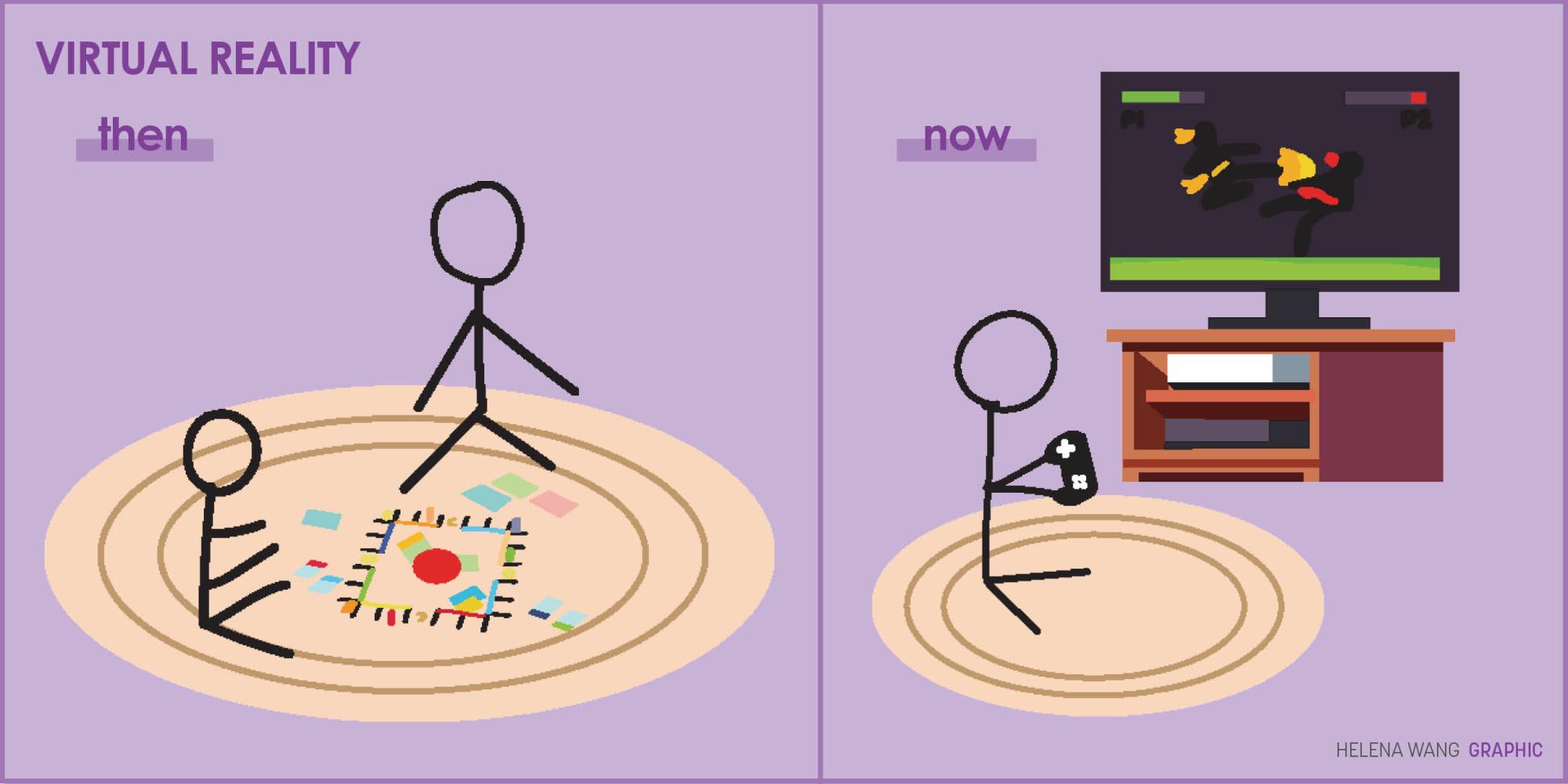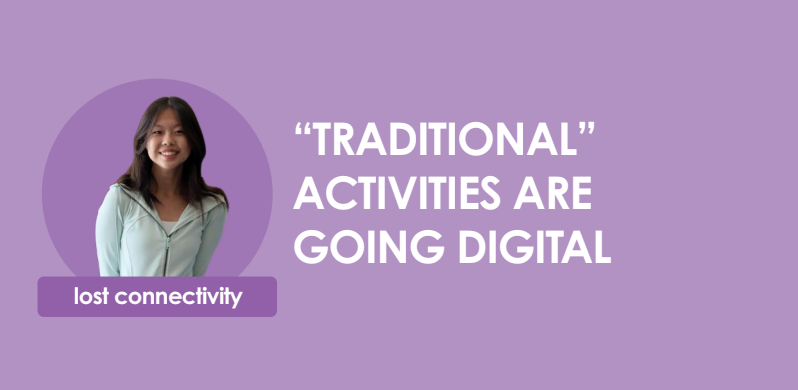When my friends and I would hang out during family get-togethers, the first thing we’d do—without fail—was pull out the “Monopoly” board. Then we’d indulge in several hours of yelling and screaming at one another. These arguments included several under-the-table negotiations that were not in the rulebook and baseless threats to our friendships. If we ever got tired of “Monopoly” or we felt that our friendships were genuinely being threatened by the game, we’d put the board away and play cards. Before we were old enough to play Monopoly or cards, we reveled in other ways: We played “The Floor is Lava” at our neighborhood playgrounds, re-enacted scenes from “Harry Potter” or some other fantastical world, tried craft tutorials or ran around pretending to be pirates.
It’s hard to tell when we stopped these activities. Age was a definite factor in the things we did when we were little, but “Monopoly” and cards are ageless. Looking back, it’s apparent things changed because of the pandemic. We weren’t allowed to hang out because of the lockdown, so we gravitated to FaceTime. We couldn’t do anything we’d normally do; it was impossible to play “Monopoly,” cards, board games or any other in-person activities. We could bake cookies together or do puzzles together on FaceTime, but it just wasn’t the same. Instead, we began to find activities we could do online—video games, “Jackbox,” “Skribbl,” etc.— and those activities ended up being the majority of what we did when we “hung out” during lockdown.

We emerged from the pandemic into, what it seemed like, a new digital era. At this point, we all had our own phones and social media accounts and were glued to them like everyone else. The world had certainly changed, and we were uncertain if it was for the better. When I hung out with my friends in person for the first time after the pandemic, we still played “Monopoly,” but we ended up playing video games an hour later. The “Monopoly” board and plastic figurines were left abandoned on the coffee table. The change was noticeable; we played non-digital games less and less and gravitated more to the activities online. We would scroll on social media together, play video games or watch YouTube together.
We still have the same amount of fun when we hang out as before the pandemic, but more often than not, we’ll find ourselves at some point—still sitting on the same couch—not talking to one another, all just scrolling on our individual phones or texting other people, until someone asks if we want to play another round of some online game. The “Monopoly” board still comes out from time to time and so does the deck of cards, but it’s less. Even when we were playing something that wasn’t online, we’d still manage to incorporate phones into that activity. There’s noticeably less connectivity in person, for lack of better words, when we hang out together.
Phones and social media do a lot of great things; so do online activities. You can have a lot of fun playing video games with your friends or watching TikTok together, and activities being online means you can connect with people who aren’t near you, which is beneficial for friends you want to talk to but could have moved away or couldn’t make it to hang out in person. Regardless, we should all be more mindful when we’re around other people that we’re actually around other people. Online activities can be done anywhere; you don’t need to be hanging out in person to participate. We should cherish the time we get to actually be with our friends and family and put our phones down for a while. Then, maybe, we could continue the game of “Monopoly.”
The views in this column do not necessarily reflect the views of the HiLite staff. Reach Jasmine Zhang at jzhang@hilite.org.

































![AI in films like "The Brutalist" is convenient, but shouldn’t take priority [opinion]](https://hilite.org/wp-content/uploads/2025/02/catherine-cover-1200x471.jpg)









































![Review: “The Immortal Soul Salvage Yard:” A criminally underrated poetry collection [MUSE]](https://hilite.org/wp-content/uploads/2025/03/71cju6TvqmL._AC_UF10001000_QL80_.jpg)
![Review: "Dog Man" is Unapologetically Chaotic [MUSE]](https://hilite.org/wp-content/uploads/2025/03/dogman-1200x700.jpg)
![Review: "Ne Zha 2": The WeChat family reunion I didn’t know I needed [MUSE]](https://hilite.org/wp-content/uploads/2025/03/unnamed-4.png)
![Review in Print: Maripaz Villar brings a delightfully unique style to the world of WEBTOON [MUSE]](https://hilite.org/wp-content/uploads/2023/12/maripazcover-1200x960.jpg)
![Review: “The Sword of Kaigen” is a masterpiece [MUSE]](https://hilite.org/wp-content/uploads/2023/11/Screenshot-2023-11-26-201051.png)
![Review: Gateron Oil Kings, great linear switches, okay price [MUSE]](https://hilite.org/wp-content/uploads/2023/11/Screenshot-2023-11-26-200553.png)
![Review: “A Haunting in Venice” is a significant improvement from other Agatha Christie adaptations [MUSE]](https://hilite.org/wp-content/uploads/2023/11/e7ee2938a6d422669771bce6d8088521.jpg)
![Review: A Thanksgiving story from elementary school, still just as interesting [MUSE]](https://hilite.org/wp-content/uploads/2023/11/Screenshot-2023-11-26-195514-987x1200.png)
![Review: "When I Fly Towards You", cute, uplifting youth drama [MUSE]](https://hilite.org/wp-content/uploads/2023/09/When-I-Fly-Towards-You-Chinese-drama.png)
![Postcards from Muse: Hawaii Travel Diary [MUSE]](https://hilite.org/wp-content/uploads/2023/09/My-project-1-1200x1200.jpg)
![Review: "Ladybug & Cat Noir: The Movie," departure from original show [MUSE]](https://hilite.org/wp-content/uploads/2023/09/Ladybug__Cat_Noir_-_The_Movie_poster.jpg)
![Review in Print: "Hidden Love" is the cute, uplifting drama everyone needs [MUSE]](https://hilite.org/wp-content/uploads/2023/09/hiddenlovecover-e1693597208225-1030x1200.png)
![Review in Print: "Heartstopper" is the heartwarming queer romance we all need [MUSE]](https://hilite.org/wp-content/uploads/2023/08/museheartstoppercover-1200x654.png)




